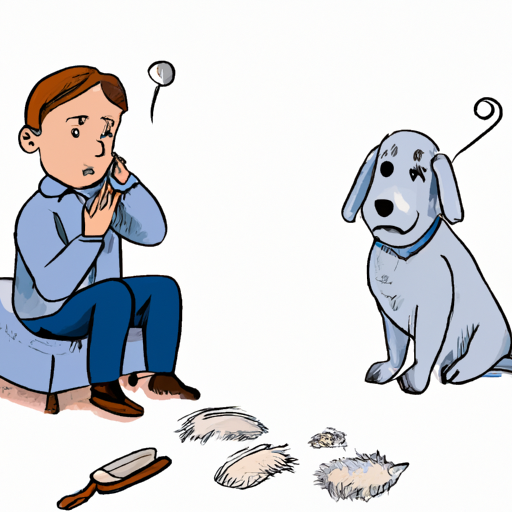Understanding the Issue
You’re a loving caregiver to your pet, so when you notice clumps of hair on your carpet or furniture, it’s natural to feel concerned. Hair loss in dogs, technically known as alopecia, can be a symptom of various conditions. It can be localized or affect the entire body, and may happen gradually or suddenly.
- Localized hair loss: This usually affects specific areas of the body.
- Generalized hair loss: This affects large parts or the entire body.
As a caregiver, it’s crucial to identify the signs early, and understand the potential reasons behind this condition.
Probable Causes
Identifying the cause is the first step towards the right treatment. Below are some causes that could be contributing to your dog’s hair loss:
- Parasites: Fleas, ticks, mites can cause itching, leading to excessive scratching or licking, resulting in hair loss.
- Allergies: Dogs can be allergic to certain foods, environmental factors or substances, causing skin irritation and hair loss.
- Hormonal Imbalance: Conditions like hypothyroidism or Cushing’s disease can lead to hair loss.
- Genetic Conditions: Some breeds are more prone to hair loss due to their genetic predisposition.
Examination and Diagnosis
Your vet will conduct a thorough examination to diagnose the problem. This could involve:
- Physical examination
- Blood tests
- Skin scrape test
- Biopsy
Once the cause is diagnosed, your vet will devise a treatment plan which may include medication, change in diet, or even surgery in extreme cases.
Preventive Measures
Preventing hair loss in dogs largely depends on the underlying cause. However, here are some general guidelines:
- Regular grooming to keep the coat and skin healthy
- Balanced diet to ensure they are getting the necessary nutrients
- Regular vet check-ups to identify any potential issues early
Treatment Options
The treatment will vary based on the diagnosis:
| Diagnosis | Treatment Option |
|---|---|
| Parasites | Topical or oral medications |
| Allergies | Elimination diet, antihistamines |
| Hormonal Imbalance | Hormone therapy |
| Genetic Conditions | Specific treatments based on the condition |
Frequently Asked Questions
Q: Is hair loss in dogs normal?
A: Some hair loss can be normal, especially during certain seasons. However, if it’s excessive, patchy, or accompanied by other symptoms like itching or redness, you should consult your vet.
Q: How can I prevent my dog from losing hair?
A: Regular grooming, a balanced diet, and regular vet check-ups can help prevent hair loss.
Q: Can hair loss in dogs be a sign of stress?
A: Yes. Just like humans, dogs can experience stress-induced hair loss. If there are no apparent medical causes, consider lifestyle changes or consult a pet behaviorist.
Remember, you know your pet better than anyone. If something doesn’t seem right, trust your instincts and consult your vet.



